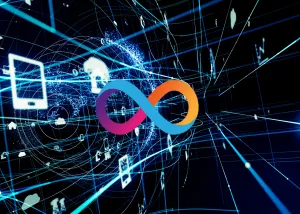The Internet Computer is well on its way to establishing itself as a trendsetter, especially in governance. $ICP holders have various ways to participate in decision-making, regardless of how many tokens they own.
Blockchains are the biggest technological innovation of the current era. The recent few years especially have seen rapid advancement and ingenuity from #BUIDLers. Blockchain technology--and the new, decentralized internet seem to be the future.
Even with market turbulence, crypto remains one of the best investment opportunities of the past decade. This is no surprise as blockchains promote financial freedom and inclusion in an increasingly connected world.
It’s no secret that governance — proper governance, at least — is essential to the smooth running of a blockchain ecosystem. Simply put, governance is a collective process for making decisions that would affect the network and its participants directly or indirectly.
The Internet Computer is well on its way to establishing itself as a trendsetter, especially in governance. $ICP holders have various ways to participate in decision-making, regardless of how many tokens they own.
However, the same cannot be said for the majority of blockchains in existence. Let's take a brief look at the present state of governance in the blockchain landscape.
State of Blockchain Governance
The current crop of blockchains relies on a closed group of core developers and key stakeholders to move forward with proposals and key protocol decisions.
Early blockchains like Bitcoin and Ethereum employ an off-chain governance architecture. For instance, all proposed changes to the Bitcoin blockchain are brought to Bitcoin core developer team meetings.
The core developers, larger developer community, miners, researchers, and the user community then discuss these modifications extensively. In theory, people are free to give their input on pending proposals.
However, in actual decision-making, the Bitcoin protocol only allows developers to make modifications through formal improvement requests. The Bitcoin improvement proposals (BIPs) are usually technical documentation submitted by core developers.
With Bitcoin, there is no on-chain governance mechanism where end users can participate in decision-making. The network has no governance token, and although holding BTC gives you a say in off-chain discussions, it does not confer explicit voting rights.
Ethereum has a similar governance model. A core development team is led by Vitalik Buterin, alongside researchers, advisers, and miners. This approach to governance has several disadvantages.
Notably, control tends to be concentrated among the core developers and miners. Key participants are usually left with two choices if the proposal reaches a standstill. They can try to convince the opposing party to switch sides or hard-fork the protocol.
We say these blockchains are decentralized, but really, are they? Not especially when you have a select few making critical decisions for the entire community.
By contrast, the Internet Computer is one of the few blockchains with on-chain governance. The Network Nervous System, the algorithmic governance system that controls the majority of development on the IC, promotes a true liquid democracy by use of staked Neurons.
Indeed, the story begins with neurons, some neurons entangled in the webbed intricacies of a big brain. As you may well know, the Network Nervous System (NNS) is the open algorithmic governance system that controls various parts of the Internet Computer network.
In simple terms, the NNS is the ‘brain’ of the Internet Computer, and neurons act quite literally as neurons of a brain.
Neurons in ICP, Briefly Explained
Neurons are the voting units that allow ICP token holders to participate in NNS governance. Thanks to neurons, we enjoy a fluid and rewarding democracy model on the Internet Computer.
You can think of neurons as delegates you appoint with your ICP tokens so they can make decisions on your behalf. A neuron holds an amount of ICP tokens that are "locked" (staked) in order to participate in voting. These tokens can be unlocked anytime; however, there’s a cooldown period ("dissolve delay").
True Decentralized Governance using Neurons
The Internet Computer's governance process works so well because of this liquid democracy.
Cryptocurrencies are notoriously volatile, with the crypto market experiencing marked swings in relatively short periods. Neurons provide the needed stability for responsible governance of the Internet Computer by ensuring that the ICP tokens they represent cannot be exchanged during the lock-up period.
Neuron Voting Rewards
Voting rewards are an essential part of the NNS because it incentivizes people to take part in governance. The DFINITY Foundation has made it as easy as possible for anyone to participate.
While the voting process is straightward, the majority of submitted proposals are technical. Voting intelligently requires familiarity with how the network operates and technology is maintained.
Thankfully, the DFINITY Foundation has made it possible for less technical neuron holders to make informed decisions by following other neurons. This can be automated or done manually. The best part is that you'll still receive your full of share of voting rewards.
Furthrmore, not only are you rewarded for voting but you can compound rewards to increase your voting power. The NNS calculates a fixed neuron reward according to a daily schedule. Eligible neurons receive a share of the rewards pool according to their relative participation.
Note: If you’d like to know how to create a neuron (and vote on proposals, as well as learn more about rewards), I’ve written a detailed guide to help you.
Closing Thoughts
The epic rise of blockchain technology has sparked much debate on novel governance models with multiple participants working together. Sadly, it is often unclear how decisions are made concerning blockchain systems.
As a case in point, the current blockchain landscape is rife with elitism on the governance front. Indeed, more often than not, you have to be part of a specific group to have a say in how a network should move forward.
Thankfully, the Internet Computer takes a different route in a bid to promote inclusive governance among all participants.
The Network Nervous System is one of the biggest DAOs in the crypto space. Anyone can contribute to making the Internet Computer ecosystem favourable for building robust decentralized applications through liquid democracy.
The low entry barrier enables ICP token holders to become neuron holders and vote on proposals easily. And what's more? You can earn substantial rewards for participating in decision-making.






Comments are for members only. Join the conversation by subscribing 👇.